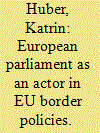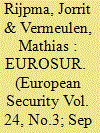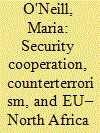|
|
|
Sort Order |
|
|
|
Items / Page
|
|
|
|
|
|
|
| Srl | Item |
| 1 |
ID:
138870


|
|
|
|
|
| Summary/Abstract |
This contribution focuses on the European Parliament (EP) as an actor in European Union (EU) border policies. It situates the Parliament in the dynamics of the Schengen project and discusses the distinct role it plays therein, as well as its impact thereon. The article argues that the EP managed to establish itself, years before the entry into force of the Lisbon Treaty, as a credible actor in border policies able to bring the citizens’ perspective into EU border policies. With its keen interest in the Schengen area as an area in which citizens can move freely without being subject to border controls, and with its focus on fundamental rights, it played, and continues to do so, a role in ensuring that “Schengen works”. The article presents its powers and the interplay with the other EU institutions, mainly on the basis of a number of key examples.
|
|
|
|
|
|
|
|
|
|
|
|
|
|
|
|
| 2 |
ID:
138872


|
|
|
|
|
| Summary/Abstract |
This article analyses the origins and development of the European Border Surveillance System (EUROSUR) in order to better understand its functioning in view of its stated objectives. Particular attention will be devoted to the European Commission’s recurring claim that one of EUROSUR’s main goals is to save lives at sea. This contribution questions that assertion. It rather considers EUROSUR as representative of the steady, technocratic development of a European system for border management. The reliance on the exchange of information, the reinforcement of FRONTEX, the European Union’s agency for the coordination of operational cooperation between national border guards and the emphasis on cooperation with third countries support this claim.
|
|
|
|
|
|
|
|
|
|
|
|
|
|
|
|
| 3 |
ID:
138873


|
|
|
|
|
| Summary/Abstract |
Links between security and migration are well established and are associated with the meaning, status, and practice of borders in the international political system. This article assesses how and with what effects the effects of environmental and climate change have entered this relationship between migration and security. It does so by assessing the EU’s external governance of migration in “South Mediterranean Partner Countries” (SMPCs): Algeria, Egypt, Iraq, Israel, Jordan, Libya, Morocco, Palestine, Syria, and Tunisia. It is argued that a focus on promoting “adaptation” and building “resilience” has developed that is consistent with the logic of governing migration from a distance. However, the article challenges ideas that environmental/climate change act as simple migration “triggers” and instead explores implications of movement towards and not away from risk, as well as the potential for populations to be trapped in areas that expose them to risk. It is shown that both have important implications for the relationship between migration, environmental/climate change, and security in SMPCs.
|
|
|
|
|
|
|
|
|
|
|
|
|
|
|
|
| 4 |
ID:
138869


|
|
|
|
|
| Summary/Abstract |
The growth of European Union (EU) competences in the field of external security in the last decade has produced a substantial increase in the number of EU institutions and bureaucratic actors engaged in the planning and management of these policies. Moreover, the expansion of competences in such a sovereign sensitive area comes up against the persistent tergovernmental nature of the security sector. This has resulted, on the one hand, in a complex institutional architecture with heavy demands in terms of coordination, and on the other hand, in a stark differentiation and stratification of the legal regimes with a potential to impact on policy outcomes. This state of uncertainty is particularly relevant when looking at relations with countries bordering the Union, as the long-standing web of interactions there has developed a more complex institutional environment. While most of the scholarly literature focuses on single institutional sectors or policies (Common Security and Defence Policy, European Neighbourhood Policy, or the external side of the Area of Freedom, Security and Justice), this study seeks to address the issue with a comprehensive analysis of the institutional framework that has emerged in the last decade, more notably, since the entry into force of the Treaty of Lisbon. The article provides, first, an overview of the EU’s institutional actors responsible for security policies in the regions bordering the EU, and second, an examination of the different mechanisms established to address the coordination issue. Finally, this study will argue that the traditional military dimension is but one, and certainly not the most developed, of the security instruments employed by the EU. At another level, it will be argued that the shift of focus from the military to other security tools has altered the institutional balance in the security sector, substantially adding to the relative influential weight of the Commission.
|
|
|
|
|
|
|
|
|
|
|
|
|
|
|
|
| 5 |
ID:
138871


|
|
|
|
|
| Summary/Abstract |
The EU is clearly in the process of developing an external dimension to the Area of Freedom, Security and Justice (AFSJ). This paper focuses on ex. Police and Judicial Cooperation in Criminal Matters (PJCCM) provisions. These developments pose specific legal basis issues for the EU, given its complex EU–member state legal relationship, and the inter-institutional balance, all reflected in the treaty framework post-Lisbon. New Court of Justice rulings are now emerging which will assist in this issue. Equally the approach to be taken in developing these relationships will be crucial. This paper proposes the adoption of an Onuf style constructivism in order to best capture the reality of the process that is developing, and has developed for the ex. PJCCM measures internally. This then needs to be allied with a constitutionalism model to ensure a balanced development of all three aspects of the AFSJ.
|
|
|
|
|
|
|
|
|
|
|
|
|
|
|
|
| 6 |
ID:
138867


|
|
|
|
|
| Summary/Abstract |
A multiplicity of legal and political arrangements regulate the European Union's external borders. With borders representing the intersection between national and international law and politics, the EU also acquired some legal competences in this realm. The resulting triple set of rules coincides with the growing disaggregation of the classical functions of borders. This state of affairs generates legal and procedural uncertainties and results in a growing ambiguity and lack of transparency, in terms of competences and accountability. Due to the EU's concerns with transnational terrorism, and the growing securitization of migration, the EU's borders with the states of the Middle East and North Africa are particularly relevant in this regard, with the resulting uncertainties touching upon fundamental rights. This article discusses the conceptual starting point of the growing institutional, legal, and political complexity at the EU's southern borders, together with relevant aspects and developments, thus also providing the background to the different contributions in this special issue.
|
|
|
|
|
|
|
|
|
|
|
|
|
|
|
|
| 7 |
ID:
138868


|
|
|
|
|
| Summary/Abstract |
This article analyses the role of narratives in European Union (EU) external relations in the revised European Neighbourhood Policy (ENP) and systematically explores how they operate in practice in the context of the EU's border management practices vis-à-vis the “southern borderlands”, in particular with respect to their inclusionary and exclusionary potential. Key EU documents and statements by EU agents, released throughout the first three years of Arab uprisings and pertaining to the revised ENP, will be subjected to a thorough examination which highlights four observations: first, in spite of the fact that the revised ENP is rooted in several narratives, some nevertheless dominate over others; second, the simultaneous presence of and recourse to different narratives contribute to an increase, rather than a decrease, of uncertainty in the EU's southern borderlands; third, despite a multitude of narratives which serve to legitimize EU action in the framework of the revised ENP, the latter perpetuates the logics of its predecessor by generating benefits mainly for the EU itself; fourth, that the first three years of the revised ENP have in practice demonstrated that an imbalance exists between on the one hand the original acceptance of the narratives by EU stakeholders and on the other hand their willingness to abide by them and fill them with life.
|
|
|
|
|
|
|
|
|
|
|
|
|
|
|
|
|
|
|
|
|